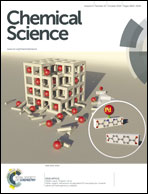Gauging metal Lewis basicity of zerovalent iron complexes via metal-only Lewis pairs†
Abstract
A range of pentacoordinate iron complexes of the form [Fe(CO)5−nLn] (L = neutral donor, n = 0–2) were treated with gallium chloride or bromide, leading to hexacoordinate metal-only Lewis pairs (MOLPs) of the form [Ln(OC)5−nFe → GaX3] (X = Cl, Br). These complexes were used to gauge the Lewis basicity of the pentacoordinate iron precursors through comparison of their experimentally- and computationally-derived Fe–Ga distances and the degree of pyramidalization at the Ga center. The data indicate that consecutive replacement of CO groups with donor ligands increases the Lewis basicity of [Fe(CO)5−nLn] complexes, with the largest effect seen upon going from n = 0 to n = 1. While the Lewis basicity differences are clear between tri-, tetra- and pentacarbonyl complexes, the difference between the ligands within each group is less clear. A series of transfer experiments were also performed, in which the GaCl3 was transferred consecutively to Fe complexes with increasing numbers of donor ligands.


 Please wait while we load your content...
Please wait while we load your content...